Transforming Jacksonville Golf Courses with Artificial Turf
Golf has long been known as a sport that demands precision and skill, played on immaculately manicured greens. However, the conventional methods of maintaining golf courses come with their fair amount of challenges, such as significant water usage, extensive and time-consuming maintenance requirements, and vulnerability to weather conditions. In recent years, there has been a groundbreaking shift in the industry with the introduction of artificial turf, and Southwest Greens of Jacksonville has emerged as a forefront leader in this realm. In this blog, we’ll dive into the innovation behind artificial turf, exploring how it revolutionizes golf courses and why Southwest Greens is at the cutting edge of this revolutionary approach.
THE HISTORY OF ARTIFICIAL GRASS
Artificial turf technology has come a long way since its first installations in the ‘60s. Early versions were criticized for their unrealistic appearance and poor performance characteristics. However, advancements in technology and materials have transformed artificial turf into a high-performing, visually appealing alternative to natural grass. Southwest Greens has worked hard to develop cutting-edge products that closely mimic the appearance, feel, and playability of natural grass.
WHAT MAKES TODAY’S SYNTHETIC TURF BETTER?
One of the most well-known aspects of Southwest Greens' artificial turf that stands out from the competition is its composition. It’s made of a multi-layered system designed to replicate the properties of natural turf. The top layer, also called the infill, is a mixture of small-grained materials such as silica, depending on the application. This layer provides stability, shock absorption, and traction, enabling golfers to achieve consistent bounce, aim, and roll (B.A.R.).
Under the infill is a backing material that increases durability, ensuring proper drainage. Southwest Greens' proprietary backing technology is engineered to stand up to heavy foot traffic and resist premature wear, making it ideal for Jacksonville golf courses that experience frequent use.
THE SCIENCE OF ARTIFICIAL TURF
The science behind Southwest Greens' artificial turf goes beyond its composition. A crucial aspect of its design is the integration of advanced fibers that simulate the characteristics of genuine grass blades. These fibers are meticulously engineered to provide an authentic appearance and optimal playing conditions. They are often made from polyethylene, which offer fantastic durability and strength. Southwest Greens leverages extensive research and development to make sure that its artificial turf products deliver consistent performance, even under intense usage.
WHY ARTIFICIAL TURF INSTEAD OF NATURAL GRASS?
One of the primary advantages of artificial grass over natural grass is its low maintenance requirements. Maintaining a natural golf course can be a time-consuming and costly endeavor. Natural grass demands frequent watering, mowing, regular fertilization, and pest control.
Alternatively, our artificial turf does away with the need for these tasks. It’s designed to withstand varying weather conditions, including severe heat and heavy rainfall, without losing its structural integrity or playability. This resilience makes it a cost-effective and sustainable alternative for Jacksonville golf courses, as it demands minimal water usage and cuts down on the need for harsh chemicals.
Southwest Greens' artificial turf gives a level of consistency that is hard to get with natural grass. Golfers regularly struggle with irregular playing surfaces, inconsistent ball rolls, and divots caused by foot traffic. With artificial turf, these issues are mitigated, providing golfers with a dependable and predictable playing experience. The advanced infill systems used by Southwest Greens make sure that the ball rolls smoothly and consistently, allowing players to focus on their technique and strategy.
WHAT ABOUT THE ENVIRONMENTAL EFFECTS OF ARTIFICIAL GRASS?
In addition to its performance benefits, artificial turf can also add to environmental sustainability. Water scarcity is a serious problem in many regions, and golf courses are often criticized for their high water consumption. By choosing artificial turf, Jacksonville golf course operators can considerably reduce their water usage, easing the strain on local water supplies.
The absence of chemical fertilizers and pesticides associated with organic grass maintenance helps reduce water pollution and soil contamination. Our company's commitment to sustainability can be seen in its dedication to manufacturing environmentally friendly turf products that align with these principles.
THE DREAM TEAM OF SOUTHWEST GREENS
Our company’s expertise is more than just the science of artificial turf. Our team of pros, including installers, designers, and engineers, really understand golf course architecture and construction. They work closely together with golf course owners and operators to build unique solutions that meet their specific needs and requirements. Whether it's developing a complex artificial putting surface or constructing an entire golf course, Southwest Greens combines scientific knowledge with practical expertise to achieve remarkable solutions.
INVEST IN THE BEST
With minimal maintenance requirements, consistent playability, and environmental sustainability, artificial grass for Jacksonville golf courses offers numerous advantages over traditional grass. Our commitment to excellence and ability to design customized solutions makes us an ideal partner for golf course owners and operators looking to embrace the future of golf course design and maintenance. Get in touch with us now for a free consultation!-
Florida
-
Georgia
-
South Carolina
